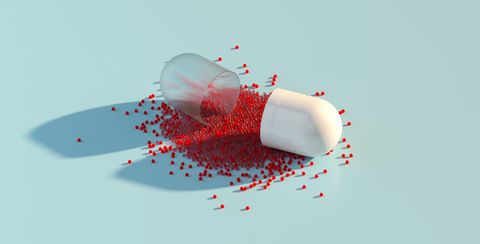©2021 Reporters Post24. All Rights Reserved.
- SOCOM is investing more money in clinical trials of anti-aging compounds.
- The chemical in question would be a nutraceutical for all cellular signs of age.
- It’s not clear in what specific ways this is likely to help U.S. military personnel.
U.S. Special Operations Command (SOCOM), the organization that administers America’s Spec Ops forces, says it will soon start clinical trials of an “anti-aging pill” that could halt some naturally degenerative effects of aging.
➡ You think science is badass. So do we. Let’s nerd out over it together.
“We have completed pre-clinical safety and dosing studies in anticipation of follow-on performance testing in fiscal year 2022,” Navy Commander Tim Hawkins, a SOCOM spokesperson, told Breaking Defense.
The pill involves what Hawkins called a “human performance small molecule” that will be fashioned into a nutraceutical form for both civilians and military personnel. He continued:
“These efforts are not about creating physical traits that don’t already exist naturally. This is about enhancing the mission readiness of our forces by improving performance characteristics that typically decline with age. Essentially, we are working with leading industry partners and clinical research institutions to develop a nutraceutical, in the form of a pill that is suitable for a variety of uses by both civilians and military members, whose resulting benefits may include improved human performance—like increased endurance and faster recovery from injury.”
A small molecule is exactly what it sounds like: a molecule with low molecular weight. Pharmaceutical manufacturer AstraZeneca, who is not involved with the anti-aging pill—SOCOM’s partner is instead the private biotech lab MetroBiotech—explains:
“[S]mall molecule drugs have some distinct advantages as therapeutics: most can be administered orally and they can pass through cell membranes to reach intracellular targets. They can also be designed to engage biological targets by various modes of action and their distribution can further be tailored, for example to allow for systemic exposure with or without brain penetration.”
So, all small molecules have low molecular weight, but not all small molecules are drugs by any means. In this case, a nutraceutical usually refers to a “dietary supplement” like a vitamin pill or an enriched protein powder. You might consider so-called “superfoods” to be nutraceuticals in the most technical sense.
The U.S. Food and Drug Administration (FDA) doesn’t regulate nutraceuticals, meaning they’re exempted from the rigorous standards that help to regulate prescription drugs, for example. Why wouldn’t the U.S. military run this substance through the right paces to become a regulated drug, especially when it’s already planning clinical trials, which are one of the key milestones to FDA approval? That’s all a bit unclear and subject to speculation for now.
The term “human performance small molecule” itself doesn’t mean much. Human performance is the sum total of nearly countless factors that could be involved, and we’ve discovered that small molecules are both just a descriptive term and something that covers most pharmaceutical drugs already. So what is the specific molecule here?
Breaking Defense says the molecule in question is something called nicotinamide adenine dinucleotide (NAD+). MetroBiotech touts NAD+ as a treatment for mitochondrial diseases in particular. Mitochondria are organelles (cell parts) that we often call the factory or powerhouse of the cell because they produce energy for the cell. This is in the form of a chemical called adenosine triphosphate (ATP).
The cell needs ATP in order to keep functioning well, and NAD+ supports the continued manufacture of ATP inside the mitochondria. That’s the direct mechanism at play, and there are consequences when cells have reduced NAD+ levels across the board. MetroBiochem elaborates:
“[R]educed levels of NAD+ are linked to aging and numerous diseases, including mitochondrial dysfunction, inflammation and a variety of associated diseases. These levels decline as humans age and remain depleted during disease states.”
The mitochondrial diseases that MetroBiochem seeks to treat are devastating, but they’re also rare and specific—not treating otherwise healthy people with a substance that will allegedly slow the effects of aging, period. That could go a long way to explaining why SOCOM is calling this a “nutraceutical” project rather than a prescription drug.
Aging itself isn’t yet a diagnosable disease to be treated by prescription. Products like Botox or cataract surgery handle side symptoms of aging that are specific and treatable.
MetroBiochem is a private offshoot of David Sinclair’s work in his eponymous Harvard University laboratory. Sinclair says the cure-all nature of the NAD+ molecule is by design, not a flaw. “This radical new thinking about medicine maintains that if we can address the upstream cause of these diseases, we can cure them all at once (instead of relying on the current Whack-a-Mole approach),” Boston magazine reported in 2019.
All speculation and skepticism aside, what are the ways that anti-aging could help support the careers of U.S. military personnel? MetroBiotech lists some key organ functions it says are supported by its technology, claiming the tech could help slow neurodegeneration, decrease inflammation in the body, increase “cardioprotection,” and more.
MetroBiotech also says NAD+ can reduce the functional effects of aging on the body, which is where factors like speed and reaction time come in. But clinical trials will go a long way to confirm what is or isn’t going to be treated by NAD+, which the military has already “spent $2.8 million on” since 2018, Hawkins said.






